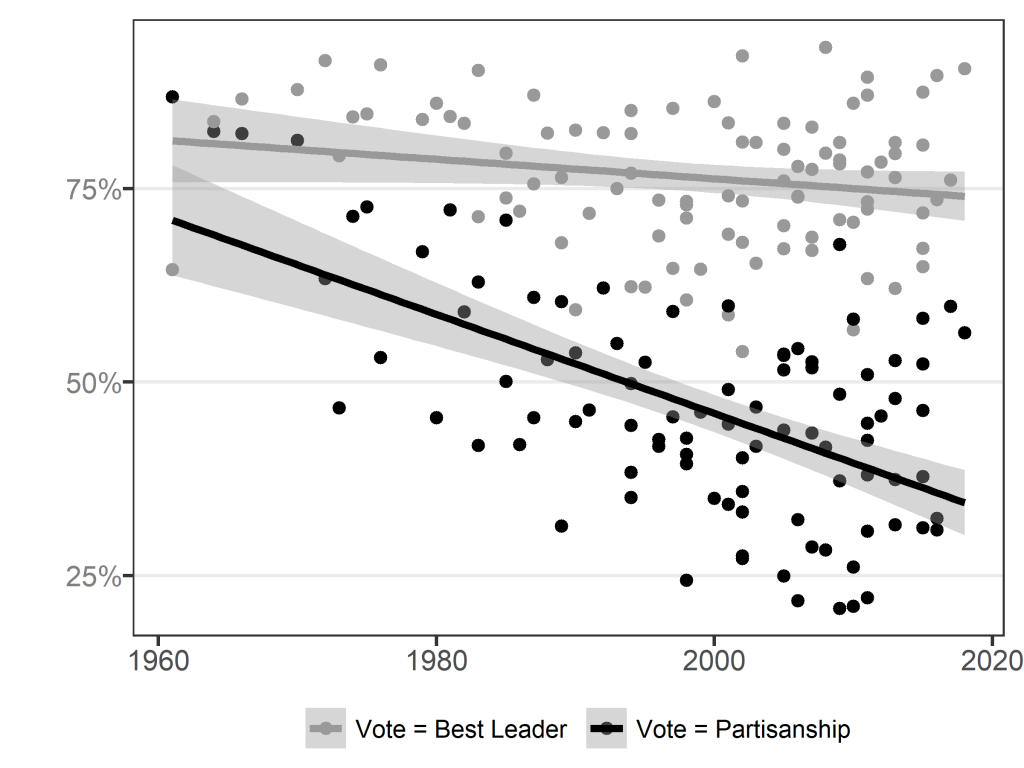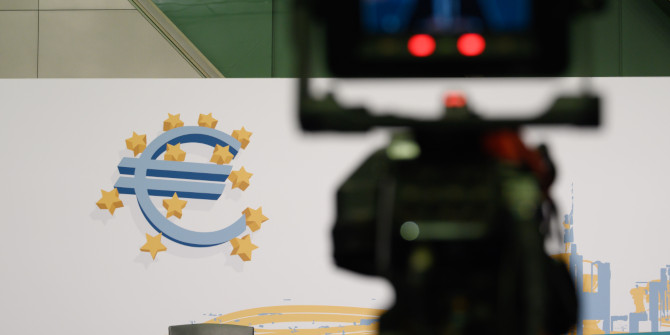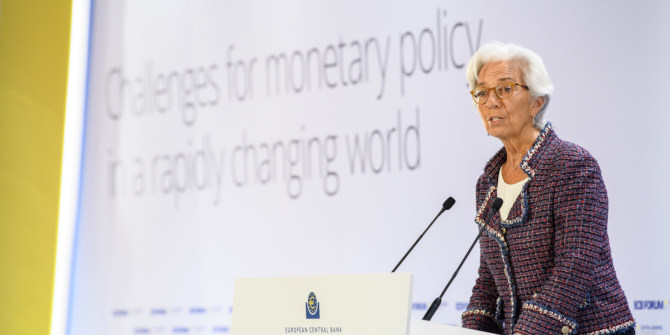It is often argued that European politics is increasingly ‘personal’, with the popularity of party leaders exerting a growing impact on the outcome of elections. Drawing on a new study, Diego Garzia, Frederico Ferreira da Silva and Andrea De Angelis assess how these dynamics have developed in western Europe since the 1960s. Their findings suggest that the personalisation of politics has taken place hand-in-hand with decreasing importance for partisanship in structuring voter choice.
Political leaders are central actors in contemporary politics. Apart from steering their respective parties, they shape political communication, and strongly influence public opinion. Modern campaigning has increasingly come to resemble a beauty contest among candidates, as the media focus has shifted from policy platforms to candidates’ personalities and private lives. Many recent studies have shown that one of the key drivers of party choice in democratic elections is voter assessments of the political leaders running for election. The key importance of individual candidates for voting behaviour has led some authors to speak of a personalisation of politics.
But have leaders become more important in voters’ minds, or have they always been this relevant? Prominent party leaders are certainly not a product of the 21st century. Studies on the personalisation of politics have long struggled to determine whether the personalisation of voting behaviour corresponds to a long-term process or if leaders are as important today as they have ever been. In a new study, we provide new insights into this debate in an attempt to reconstruct its long-term dynamics from a comparative perspective.
One of the main obstacles faced by previous studies involves data availability. In an age where data is cheap and abundant (see for instance the recent contribution by Russ Dalton), data stemming from high-quality electoral surveys is often not integrated, hindering comparative and longitudinal efforts. In particular, no comparative dataset has been available to researchers wishing to track the long-term relationship between party leader evaluations and voting decisions across the extended time span covered by national election study projects.
To fill this void, we dug into more than a hundred original surveys dating back to the 1960s to assemble the West European Voter (WEV) dataset. The unique feature of this dataset is that it provides a long-term perspective on the drivers of electoral decision-making, harmonising a total of 129 datasets collected in 14 West European parliamentary democracies over the period 1961-2018. The focus on parliamentary democracies is motivated by the attempt to understand if political leaders can also guide voters’ decisions outside of presidential systems, where their centrality is granted by the institutional setting.
The analysis of this original data revealed elements regarding the trajectory of voting behaviour that shed new light on the process of personalisation and its relationship with partisan dealignment and disintermediation. Figure 1 below shows the percentages of voters aligning their vote with the highest rated leader, and with the party they identify with.
Figure 1: Percentage of voters who back the party of their preferred political leader and the party they feel closest to in West European elections
Note: For more information, see the authors’ accompanying paper in West European Politics.
We find that about 80 percent of individuals report voting for the party of their preferred leader – this is the case in the 1960s and in every other decade until the 2010s. Should we then conclude that contemporary voters are similar to the voters of the 1960s? A second finding of our research suggests that this is not the case. In particular, party attachments have lost their importance for guiding voting decisions. While over 70 percent of the voters supported the party they felt “closest to” in every election held in the 1960s, this share has fallen to below 40 percent in the last decade. This evidence supports the so-called “dealignment hypothesis,” suggesting that voters are increasingly self-reliant and detached from party structures and communities. The fading-away of partisanship has created room for leaders to emerge as the key determinants of vote choice in recent decades.
Furthermore, evidence from an analysis of panel data from selected countries shows that once individuals de-align, they start ascribing greater importance to leader assessments in their voting decisions. In sum, our findings suggest that the personalisation of voting behaviour – translated into increasing leader effects on vote choice – has taken place hand-in-hand with the decreasing importance of partisanship in structuring vote choice.
This finding offers a long-term frame of reference to some of the most visible trends in contemporary party politics and public opinion. First, the successful campaigns of strong political leaders, like Donald Trump or Matteo Renzi, that take control of established parties, or even the launching of brand new personalistic parties by political entrepreneurs like Silvio Berlusconi or Andrej Babiš. Second, the growing volatility of elections, with swift changes in electoral strength and a greater chance of success for new challenger parties. Third, the centrality that media grant to established and new political leaders to expand their audience, and the growing reliance of political leaders on personal social media accounts to connect with their supporters.
Of course, some key aspects of this transition towards an electoral democracy centred around political leaders are yet to be addressed. On the one hand, it is unclear what role social media plays in the process. By providing the tools for direct and personalistic campaigning, social media may accelerate the personalisation dynamic marking the void surrounding traditional political party organisations. Furthermore, campaigning trends also register high levels of political resentment across party lines, and it is unclear whether greater attachment to party leaders is propulsive or the reflection of this more negative style of campaigning.
In conclusion, our research depicts a grim prospect for the central actor of representative democracy: the political party. Our findings very much echo the spectre of a “partyless democracy,” described by Peter Mair some two decades ago with reference to the New Labour government of Tony Blair.
For more information, see the authors’ accompanying paper in West European Politics
Note: This article gives the views of the authors, not the position of EUROPP – European Politics and Policy or the London School of Economics. Featured image credit: Andrew Parsons / No 10 Downing Street (CC BY-NC-ND 2.0)







What about the “personal qualities” the press and others attribute to political figures. What kind of personalization is it and what do you call it?